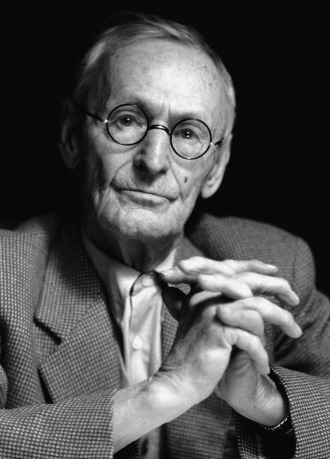The below is pasted from a blog I follow called "Dead Writers Club." I won't ever have to think, geez, I don't have anything new worth reading until I've read every single word that Hesse wrote. His The Glass Bead Game (sometimes published under the title Magister Ludi -- Latin for "master of the game") is perhaps the most spiritually uplifting novel I've ever read; it elevated me as I read it. He's one of the greatest of the greats, one of the guys whom I want to be my friend in the next life.

Hesse is probably best remembered for his novel, Siddhartha, published in 1922. If you have not read it, we’ll not spoil the experience for you here, but we will say that Hesse’s crafting of Siddhartha’s journey is delightfully revealing of both the author, the subject and… the reader. Hmm… not sure if that last bit made sense… well… read the novel and you’ll see what we mean!
Our favorite work by Hesse is his 1919 novel, entitled Demian, which he wrote after his son had suffered traumatic illness, his wife had experienced a nervous breakdown, and his father had just died. Keep in mind, also, that this book was written right after the United States had declared war on Germany! To say this book is “intense” and loaded with societal angst and uncertainty, is a gross understatement.
Hesse received the Nobel Prize for Literature in 1946. Some of his other notable works include: Narcissus and Goldmund (1930), Gertrude (1910), The Journey to the East (1932), The Glass Bead Game (1943), and Steppenwolf (1927). For more biographical information on this fascinating man, please check out this link at nobelprize.org.
Today, draw upon your own personal tragedies to find the “understanding” Hesse found in Siddhartha or the great realization of self that Emil found in Demian. Ask yourself if the totality of your experiences allows you to attain understanding in the same way. Seek the truth as you meander through the dark corridors of your memories.
Write on in peace, Mr. Hesse!
Happy Deathday, Mr. Hesse!
On this day in 1962, German author, Hermann Hesse, died of a Cerebral Hemorrhage. He died in Switzerland at the age of 85.
Hesse is probably best remembered for his novel, Siddhartha, published in 1922. If you have not read it, we’ll not spoil the experience for you here, but we will say that Hesse’s crafting of Siddhartha’s journey is delightfully revealing of both the author, the subject and… the reader. Hmm… not sure if that last bit made sense… well… read the novel and you’ll see what we mean!
Our favorite work by Hesse is his 1919 novel, entitled Demian, which he wrote after his son had suffered traumatic illness, his wife had experienced a nervous breakdown, and his father had just died. Keep in mind, also, that this book was written right after the United States had declared war on Germany! To say this book is “intense” and loaded with societal angst and uncertainty, is a gross understatement.
Hesse received the Nobel Prize for Literature in 1946. Some of his other notable works include: Narcissus and Goldmund (1930), Gertrude (1910), The Journey to the East (1932), The Glass Bead Game (1943), and Steppenwolf (1927). For more biographical information on this fascinating man, please check out this link at nobelprize.org.
Today, draw upon your own personal tragedies to find the “understanding” Hesse found in Siddhartha or the great realization of self that Emil found in Demian. Ask yourself if the totality of your experiences allows you to attain understanding in the same way. Seek the truth as you meander through the dark corridors of your memories.
Write on in peace, Mr. Hesse!
No comments:
Post a Comment